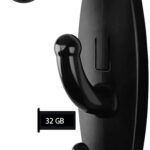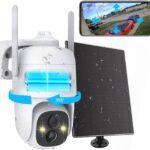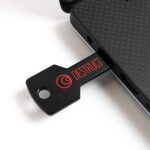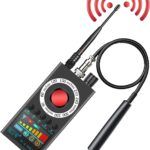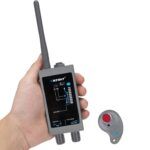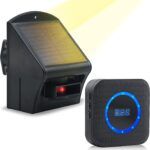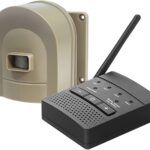- How does a GPS tracker work?
A GPS (Global Positioning System) tracker is a device that uses satellite signals to determine the location of a person or object. The device receives signals from GPS satellites in orbit and uses triangulation to calculate the precise location of the device anywhere on Earth. The GPS tracker can then transmit this information to a central server or to a user’s device for real-time monitoring of the device’s location. GPS trackers can also store location data over time, providing a detailed history of a device’s movements. GPS trackers can be used for a variety of purposes, such as tracking the location of vehicles, people, pets, or assets like equipment or packages.
GPS trackers can be passive or active. Passive GPS trackers simply record location data and store it for later retrieval, while active GPS trackers transmit location data in real-time or at set intervals. GPS trackers can be integrated into a wide range of devices, from standalone GPS trackers to smartphones, fitness wearables, and more. GPS trackers are widely used in fleet management, logistics, personal safety, and other applications where real-time location data is critical.
- How accurate are GPS trackers?
GPS trackers are highly accurate and can provide real-time location information with an accuracy of a few meters. The accuracy of GPS trackers depends on various factors such as the number of satellites in view, the quality of the GPS receiver, and the environment in which the GPS tracker is used. Generally, GPS trackers used in open environments with a clear view of the sky have better accuracy than those used indoors or in urban areas with tall buildings that can block the GPS signals. However, advancements in technology have made GPS trackers more accurate even in difficult environments, such as the use of Assisted GPS (A-GPS) or multi-constellation receivers that can access signals from multiple satellite systems like GPS, GLONASS, and Galileo.
It is important to note that GPS accuracy can vary depending on the purpose of use. For example, for commercial applications like fleet management, an accuracy of a few meters is sufficient, but for military and aviation applications, the accuracy requirements can be as high as a few centimeters.
- How long do GPS tracker batteries last?
The battery life of GPS trackers depends on several factors, including the type of device, how often it updates its location, and how frequently it sends data. Generally, battery life can range from a few days to several months. For instance, a small GPS tracker with real-time tracking capabilities may have a battery life of a few days, while a larger tracker with less frequent location updates may last several months on a single charge.
It’s essential to consider the battery life when choosing a GPS tracker to meet your needs. A device with a shorter battery life may be more suitable for tracking items or people over a short period, while a device with a longer battery life may be better suited for long-term tracking or for tracking vehicles or equipment that are difficult to access. Some GPS trackers have features such as power-saving modes or solar charging options that can extend battery life.
Some of the vehicle GPS trackers you can find in our shop can be directly plugged to a car battery and can work indefinitely.
- Can GPS trackers be used for real-time tracking?
GPS trackers can be used for real-time tracking. These trackers use cellular networks to send their location data to a central server, which can be accessed through a web or mobile app. This allows you to see the device’s location in real-time on a map. Real-time tracking can be useful for monitoring the location of vehicles, people, or assets in real-time, which can be useful for fleet management, personal safety, or theft prevention.
It’s worth noting that real-time tracking may require a subscription plan or additional fees, as cellular data usage can be costly. Some GPS trackers also have limitations in terms of cellular coverage, so it’s important to consider your location and cellular network coverage before choosing a GPS tracker for real-time tracking.
- Do GPS trackers require a monthly subscription?
In most cases, GPS trackers do require a monthly subscription. This is because the tracker sends data to a server, which is then accessible to the user through an app or web interface. The server requires maintenance and upkeep, which is paid for through subscription fees. Some trackers may come with a built-in SIM card and require a separate data plan, while others may come with a pre-paid subscription for a set period of time. It’s important to consider the cost of the subscription when purchasing a GPS tracker and ensure it fits within your budget.
Some companies may offer GPS trackers without a subscription, but these often have limited functionality or may require you to set up your own server and manage the data yourself. These options may be more suitable for those with technical expertise and the time to invest in managing the tracker’s data.
Take a look at Onamicit GPS Tracker if you need one with basic functionality but no subscription requirements.
- Can GPS trackers be hidden?
Many GPS trackers are small and discreet, allowing them to be hidden inside objects or vehicles without being noticed. For example, some GPS trackers are designed to look like keychains or other everyday items, while others can be placed inside a car’s dashboard or under the hood. Some GPS trackers are also designed to be magnetically attached to a vehicle, making them easy to attach and remove as needed.
It’s worth noting, however, that there are legal and ethical considerations when it comes to hidden GPS trackers. In some cases, it may be illegal to track someone without their knowledge or consent, so it’s important to familiarize yourself with the laws in your area before using a GPS tracker. Additionally, hiding a GPS tracker without someone’s knowledge could be considered an invasion of their privacy, so it’s important to consider the potential ethical implications as well.
- Are GPS trackers legal?
GPS trackers are generally legal for personal use, but the laws surrounding their use can vary by country and region. In many cases, it is legal to use GPS trackers to monitor the location of vehicles that you own, such as a fleet of company cars or personal vehicles. However, it is important to note that using GPS trackers to monitor the location of another person’s vehicle without their consent is generally illegal and considered a violation of privacy.
In some cases, using GPS trackers may also be restricted in certain areas or situations. For example, some schools may prohibit the use of GPS trackers on school buses, while some rental car companies may prohibit the use of GPS trackers on their vehicles. It is important to research and understand the laws and regulations surrounding the use of GPS trackers in your specific area before using them.
- Can GPS trackers be used to track vehicles?
Tracking vehicles is one of the most common applications of GPS tracking devices. Vehicle GPS trackers are often installed discreetly in a car, truck, or other type of vehicle, and are used to monitor the vehicle’s location, speed, and other information in real time.
GPS trackers can be especially useful for businesses that want to keep track of their fleet of vehicles, as well as for individuals who want to monitor the whereabouts of their own vehicles. Vehicle GPS trackers can also help recover stolen vehicles by providing real-time location information to law enforcement agencies.
- Can GPS trackers be used to track people?
It is important to respect people’s privacy and personal space, and the use of GPS trackers on individuals without their consent is generally considered an invasion of privacy and may even be illegal in some jurisdictions. However, GPS trackers can be used for legitimate purposes, such as tracking employees during work hours, monitoring children’s location for safety reasons, or keeping track of elderly with medical conditions such as Alzheimer’s or dementia. It is important to use GPS trackers responsibly and ethically, and to be aware of the legal and ethical implications of their use.
- Can I legally use a GPS tracker on my kids?
The legality of using GPS trackers on children can vary depending on the location and circumstances. In general, using a GPS tracker to monitor the location of your child is legal as long as you are the legal guardian of the child and they are under the age of 18. However, there are some restrictions in certain areas, such as in schools or other public places, where privacy laws may prohibit the use of such devices.
You should have a conversation with your child and obtain their consent before using a hidden GPS tracker to avoid any potential violations of their privacy. If you are concerned about your child safety there is rarely any need for placing hidden GPS trackers in their schoolbags, instead make sure to talk to them with your concerns.
It is crucial to note that using GPS trackers on children should be done with caution and care. While they can be useful in ensuring the safety and security of your child, they should not be used as a substitute for proper supervision and communication with your child. It is also important to use GPS trackers that have appropriate privacy and security measures in place to protect the data collected from the device.
- Can I legally use a GPS tracker on parent with Alzheimer's?
Using a GPS tracker on a parent with Alzheimer’s (or any similar medical condition) is a complicated legal issue that varies depending on your location and the specific circumstances of the situation. In general, the use of a GPS tracker for safety and security purposes may be legal if it is done with the consent of the parent or their legal guardian. However, if the parent has not given their consent or if they have objected to the use of a GPS tracker, then it may be illegal to use one. Additionally, there may be privacy laws or regulations that restrict the use of GPS trackers in certain locations or situations. It is important to consult with a legal expert or healthcare professional to ensure that you are following all applicable laws and regulations if you are considering using a GPS tracker on a parent or other family member with Alzheimer’s.
- Can GPS trackers be used to track pets?
GPS pet trackers are small, lightweight devices that can be attached to your pet’s collar, allowing you to track their location in real-time. Some GPS pet trackers also come with additional features, such as activity tracking, health monitoring, and geofencing. With a GPS pet tracker, you can easily locate your pet if they go missing, and ensure their safety and wellbeing.
It’s important to note that GPS trackers should not replace proper pet supervision, and should be used as a supplement to other forms of pet safety and training. Additionally, it’s important to choose a GPS pet tracker that is appropriate for the size and behavior of your pet, and to ensure that the device is properly charged and maintained.
- How do I access the data from a GPS tracker?
To access the data from a GPS tracker, you will typically need to use a software application or online platform provided by the manufacturer. Some GPS trackers come with a dedicated app that can be installed on a smartphone or tablet, while others require you to access the data through a web-based interface. Once you have logged in, you should be able to view the location history of the tracker, as well as any other data that it has recorded such as speed, distance traveled, and battery level.
It’s worth noting that some GPS trackers may require a monthly or annual subscription in order to access the data. Additionally, certain types of GPS trackers may have limitations on the amount of data that can be stored, so it’s important to check the specifications of the device before making a purchase.
- Can GPS trackers be used internationally?
The ability of GPS trackers to work internationally depends on the device’s specifications and the country in which it is being used. Most GPS trackers use satellite signals to determine their location, which means they should work in any location where there is an unobstructed view of the sky. However, some countries may have different regulations regarding GPS technology, and some GPS trackers may only be designed to work in specific regions or countries. You should check the device’s specifications and verify that it is compatible with the country where it will be used before purchasing and attempting to use a GPS tracker internationally.
You must also be aware that international use of a GPS tracker may incur additional charges, such as roaming fees or data charges. It is recommended to check with the device manufacturer or service provider regarding any potential fees or restrictions related to international use.
- Can GPS tracking be disabled or jammed?
GPS tracking can be disabled or jammed, but it depends on the type of tracker and the method used to disable or jam it. In general, GPS jammers work by broadcasting radio signals on the same frequency used by GPS devices, which disrupts the communication between the GPS device and the satellite. The use of GPS jammers is illegal in many countries, including the United States, and can result in fines and other legal consequences.
On the other hand, GPS tracking can also be disabled by physically removing the tracker or by interfering with its power source, such as by disconnecting the battery. Some GPS trackers come with anti-tampering features that alert the owner if the tracker is being tampered with or disconnected. It is important to note that disabling or jamming GPS tracking without authorization is illegal and unethical.
GPS trackers, cameras and other surveillance devices allow you to keep a constant eye on the location of your property, vehicles, pets or loved ones.
Showing all 9 products:

Cooau WiFi Mini Dash Cam Recorder
$89.99
LeonardCreek Pet GPS Tracker & Locator
$29.99-
Sale!

Onamicit Tiny Magnetic GPS Tracker (No Subscription)
$16.99 
Optimus Car GPS Tracker (OBD Plug-In)
$59.95
Optimus Vehicle GPS Tracker (Wireless)
$39.95
Pelsee P12 Mirror Dual Dash Cam
$129.99
Wolfbox Mirror Dash Cam (Front & Back Dual Cameras)
$159.99
Wolfbox WiFi Dash Camera (Front & Rear)
$199.99
Zeerkeer Mini GPS Tracker
$66.98
GPS tracking devices are widely used for a variety of purposes, from tracking vehicles and assets to monitoring the location of people and pets. These devices use the Global Positioning System (GPS) to determine their precise location and transmit that data to a central server or a mobile device. GPS trackers have become increasingly popular in recent years, thanks to advancements in technology and the widespread availability of mobile networks.
GPS tracking devices come in various forms, including standalone devices, vehicle tracking units, and wearable devices. They can be used for personal or business purposes, such as monitoring the whereabouts of family members, keeping track of employees, or ensuring the security of valuable assets. With the ability to track location in real-time, view historical data, and set up geofencing alerts, GPS tracking devices provide a powerful tool for managing and monitoring various aspects of our lives.
GPS Tracking FAQ
Don’t forget to look at our Item Trackers if you need short-range tracking via Bluetooth or RF. Item trackers are inexpensive devices which are immensely helpful for locating your keys, luggage, or other possessions.







